Ukraine's fugitive president, Viktor Yanukovych, admitted on Wednesday that he had been wrong to invite Russian troops into Crimea and described Ukraine's loss of the Black Sea peninsula as a "major tragedy".
In his first comments since Russia formally annexed Crimea last month, following a referendum not recognised by the west, Yanukovych said he still hoped to negotiate with Vladimir Putin to get the region back.
Yanukovych said he had met the Russian president and hoped to hold negotiations with him over Crimea's return.
"Crimea is a tragedy, a major tragedy," he told the Associated Press. "We must search for a way to return Crimea on any conditions, so that Crimea has the maximum degree of independence possible … but be part of Ukraine." His conversation with Putin had been calm but difficult, he said.
Yanukovych was speaking in Rostov-on-Don, the city in southern Russia where he fled to six weeks ago after mass anti-government protests. He declined to condemn the Kremlin for invading Crimea and sending in thousands of undercover soldiers to capture its parliament and airports. Instead he blamed Kiev's new interim government.
According to Yanukovych, "bandits" and radical nationalists had grabbed power in the capital, Kiev. They had then tried to "dictate how people should live" and threatened the Russian language – setting off a disastrous counter-reaction and Crimea's referendum to join the Russian Federation. "If I had been president I would have tried to stop this from happening," he declared.
The comments came as Nato's top military commander said it was entirely feasible Russia could stage a further invasion. Philip Breedlove, Nato's supreme allied commander in Europe, said Russia had amassed so many troops on Ukraine's border it could comfortably carry out another "incursion" in three to five days.
"This is a very large and very capable and very ready force," Breedlove said. Russia's next objective might include creating a land corridor in southern Ukraine, stretching from Crimea to Odessa and even to Trans-Dniester, the Moldovan Russian-speaking breakaway territory, he said. The US and EU have repeatedly warned Moscow not to advance into southern and eastern regions.
Nato's military chiefs believe that, despite the withdrawal of one battalion, announced on Monday, Russia has 40,000 troops stationed on the border, with aircraft and helicopter support as well as field hospitals and electronic warfare capabilities.
Breedlove described the situation as "incredibly concerning". He told Reuters: "We think it [the Russian troops and equipment] is ready to go and we think it could accomplish its objectives in between three and five days if directed to make the actions."
In his interview, Yanukovych advocated giving greater autonomy to Ukraine's regions – a key demand among anti-Kiev protesters in Russophone eastern cities such as Donetsk and Kharkiv. The provisional government has already promised decentralisation and announced this week that provincial governors will in future be elected by local regions, rather than appointed by the president.
Presidential elections will be held on 25 May. Yanukovych suggested that these could scarcely be considered legitimate because his eviction from office was unconstitutional.
He shrugged off accusations of personal corruption. Documents found at his abandoned palace near Kiev suggest he spent millions of dollars on furniture, as well as hundreds of thousands on fresh flowers. They also reveal that his aides kept personal details of leading members of the opposition, including investigative journalists who were then attacked.
Yanukovych conceded that he did own dozens of vintage cars but denied knowledge of a much-mocked golden loaf of bread found at his former opulent residence.
He also denied longstanding claims that he had enriched his family and inner circle, in particular his billionaire dentist son Oleksandr, the beneficiary of numerous state contracts. The EU and US have put Yanukovych and members of his entourage on a sanctions blacklist.
The new government in Kiev, meanwhile, made up of former opposition parties and Maidan activists, has issued a warrant for his arrest. It has also charged him with the "mass killing of civilians".
During the uprising against Yanukovych, suspected government snipers shot dead about 80 protesters. New video and photographs suggest the snipers were Russian-trained members of the Alfa team, an elite unit based at the HQ of Ukraine's SBU state security service.
On Wednesday, however, Yanukovych denied giving orders to his security forces to open fire. Instead, he claimed, "radical elements" from the anti-government Maidan had used weapons – a statement at odds with the fact that the overwhelming number of victims were anti-government protesters.
He insisted: "Weapons were never distributed to those special forces who defended government buildings and carried out their functions according to the law." He said he had always eschewed the use of force, including during Ukraine's 2004 Orange revolution.
He was dismissive of the European Union which, he said, had reacted "emotionally" when he abandoned plans last November to sign an association agreement. Yanukovych instead agreed a $15bn bailout with Moscow. This triggered the streets protests in Kiev that led to his downfall. After he fled the capital, Yanukovych said, "bandits" had opened fire on his cortege, injuring one of his security officers. The EU had failed to denounce this attack, he said. "I've not heard one word of condemnation from them."
Russia, meanwhile, suggested that Nato would be the loser from any new confrontation. The military alliance has severed co-operation with Moscow and has signalled that it is rethinking the deployment of its forces across eastern Europe, to counter a new Russian threat.
The foreign ministry spokesman Alexander Lukashevich said that the bloc's protests over the annexation of Crimea were reminiscent of western rhetoric following the brief Russian-Georgian war in 2008. There was a sense of déjà vu, Lukashevich said, adding: "The language of the statements rather resembles the verbal jousting of the cold war era."
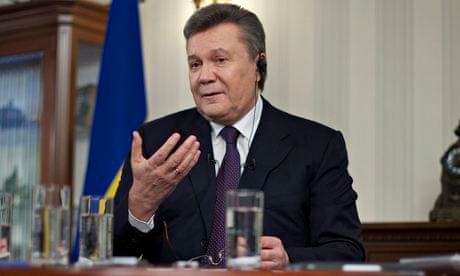
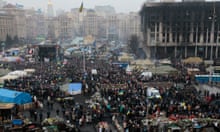

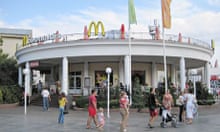
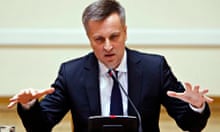

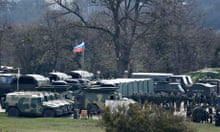

Comments (…)
Sign in or create your Guardian account to join the discussion